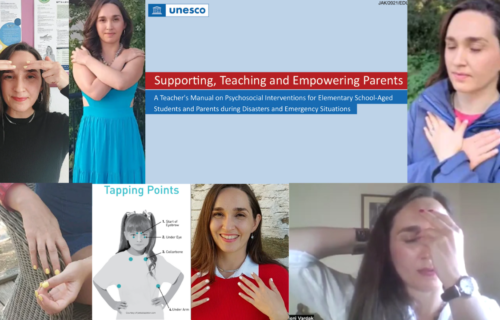
EFT Research and CBT Research on Exam Stress
WHAT’S THE ISSUE: Research shows that a 10-week stress management intervention can lead to an increase in a teenager’s academic performance by an average of one GCSE grade…per subject! This was the outcome of a Cognitive Behavior Therapy (CBT) based stress management intervention study that was published in the UK in 2006. CBT has been recognized as one of, if not the most effective intervention out there for school-related stress and exam anxiety/performance anxiety. However, we now have a number of studies in a growing body of EFT research that show EFT is directly comparable to, and in some cases better than, CBT. In this article, you will learn about the research that shows how:
- teenagers who received an additional 10-week cognitive-based stress management intervention to help them psychologically prepare for their final exams achieved, on average, one grade better than their peers.
- the Emotional Freedom Technique (EFT) is equivalent to the CBT Gold Standard intervention for stress management – and in some cases, better.
EFT is often quicker, and therefore cheaper than CBT. But where EFT really differs from CBT is that it’s a self-management tool. It’s a technique that once you have been taught it, you can use for the rest of your life. And while its application in this article is focused mainly on problems to do with school-related stress and anxiety, EFT can have more general application to other stress-related problems such as cravings, weight loss, and addictions.
BOOSTING ACADEMIC ACHIEVEMENT IN SCHOOLS VIA A STRESS MANAGEMENT INTERVENTION
“In sum, the current study presents strong evidence that the CBT (Cognitive Behavior Therapy) Stress Management Intervention has great efficacy and potential use in terms of improving educational performance, and the mental health of school children. Examination performance seems to benefit from higher levels of motivation.”
Dr Keogh, Dr Bond, Dr Flaxman (2006) “Improving Academic Performance and Mental Health Through A Stress Management Intervention”
Most adolescents in the United Kingdom (UK) sit a series of exams called General Certificate of Secondary Education (GCSE) examinations when they are around the age of 15–16 years. The grades they get largely determine whether or not kids make it into Uni/college. Understandably, many students report high stress levels when they are studying for, and taking, their final GCSE examinations.
We know that too much stress can negatively affect academic performance in exams, causing students to freeze, blank out, and have irrelevant thoughts that hold them back from being able to show what they know in their exams. We also know that stress affects motivation to study and try your best. What we didn’t know – prior to the study led by Keogh, Bond & Flaxman (2006) – was how much stress could affect students’ final GCSE exam grades, in concrete terms. It examines the impact of a stress management intervention on externally assessed exam grades.
Researchers studied the impact of a 10-week stress management intervention, which was delivered during the normal school day. Students who were not randomly allocated into the control group were taken out of their normal school day classes, once a week, to receive the cognitive-based stress management intervention. All students sat their exams about 8 weeks after the intervention ended.
The teenagers who were randomly allocated to receive the cognitive-based Stress Management Intervention scored an average of one grade higher…per subject, than those who were in the control group! So instead of getting a D, for example, in their final History exam, they got a C. The difference between a C or D could cost a student entry into university; most good UK universities want a C and above in a student’s GCSE scores.
When it comes to the significance of this study for UK schools, I want to quote the researchers: “In an age of school league tables and increasing pressure for pupils to perform better, the potential outcome of such a psychological intervention, if adopted by UK schools, is a significant improvement in examination performance. We also believe that these findings are unique in that, as far as we are aware, no study has investigated the effects of a Stress Management Intervention on the performance of school children taking a standardized examination in the UK.” You can learn more about this study by following the reference link at the end of this article.
This research is also valuable for international schools. Stress Management interventions for international school students who are preparing for external examinations such as IGCSE and IB Diploma exams may offer a meaningful solution to the over-tutoring problem. The study shows that it is possible to empower teenagers to become more self-motivated, self-directed learners. This is where stress management interventions for students can help.
STRESS MANAGEMENT INTERVENTIONS and EFT RESEARCH: CBT COMPARED TO EFT
“Has (EFT) been compared to Gold Standards? Of course it has. And one of the big areas has been Test Anxiety…When we run Test Anxiety clinical trials, certainly when we compare it to Cognitive Behavioral Therapy, CBT, it’s comparable. EFT Tapping and CBT…are highly comparable. They get the same outcomes. But here’s where the difference lies…we can achieve the same outcomes for people…in half the time, and obviously half the cost…Might we not consider that true emotional freedom?”
Dr Peta Stapleton (2018) “Is Therapy Facing a Revolution?” TEDx
We have known for some time that Cognitive Behavior Therapy (CBT) can help to reduce student stress and help to improve their academic performance in exams. With many fee-paying school budgets challenged by the COVID crisis, more schools and families are seeking quicker, more cost-effective stress management interventions for boosting student well-being. And this is where the new kid on the block, Emotional Freedom Techniques (EFT) seem to compare quite favorably to CBT.
The outcome of EFT research is that EFT is just as (if not more) effective than CBT for exam anxiety and other stressors. Dr Peta Stapleton is the world-leading Clinical Psychology researcher on EFT. She’s done a number of comparison studies, comparing the results people get from participating in a CBT intervention with the results people get from participating in an EFT intervention for a variety of stress-related problems. The reason why Dr Stapleton frequently uses CBT to compare to EFT is that CBT is an evidence-based, Gold Standard therapeutic intervention. So if EFT can hold its ground when compared to CBT, it says a lot about the effectiveness of EFT.
In her groundbreaking book, The Science Behind Tapping: A Proven Stress Management Technique for the Mind and Body, Dr. Stapleton shares study after study where EFT holds its ground as being clearly comparable to CBT in the results people get. Interventions studied include CBT/EFT programs for:
- cravings
- addictions
- weight loss
- anxiety
- depression
- phobias
- PTSD
The results of the CBT/EFT comparison studies show that EFT is as effective as CBT, if not better. On the whole, the results from EFT interventions last longer, and require fewer sessions to achieve comparable results. Basically, EFT can save individuals and organizations money.
After more than a decade focused on researching EFT for adults to ascertain whether EFT is comparable to CBT (which we now know with certainty – it is), EFT research attention is now shifting a bit more towards whole-school EFT initiatives. Dr. Stapleton and her team are currently tracking the progress of Primary School students ages 5 to 13 in several whole school projects in Australia. Every teacher in these schools has learned EFT and is using it daily for themselves and their students. The outcomes are being documented over a span of 7 years. It will be interesting to see what we can learn from this big research project in the coming years.
In the meantime, we can act on the knowledge that even small-scale EFT stress management interventions for school and university students have led to positive outcomes in the following areas related to academic stress and anxiety:
- goal-setting
- fear of failure
- test anxiety
- mathematics anxiety
- public-speaking anxiety
- emotional distress of having learning disabilities
- academic stress in high-achieving students
The biggest research study to date on EFT in schools was conducted by Dr. Stapleton and her team. It looked at 200 Year 10 students from 2 Australian high schools. They found was that even a short 5-week EFT intervention in support of student well-being can have lasting results in decreasing students’ fear of failure.
Perhaps one of the most striking EFT research studies to date was a pilot study comparing EFT, CBT, and a hybrid of EFT and EMDR (EMDR is a trauma therapy) for test anxiety in university students. The research was led by Canadian Psychiatrist Dr. Dan Benor and his colleagues in 2009, with 5 students in each of the three groups. They found that EFT and the EFT-EMDR hybrid intervention got quicker results in reducing test anxiety than CBT. The results gained after 5 sessions of CBT were achieved in the EFT and EFT-EMDR interventions, in only 2 sessions.
This rapidly growing body of new psychology research has led to a rise in schools wanting their teachers to be trained in how to bring EFT into the classroom as a daily stress-regulation skill. EFT tapping is now being used as a daily tool for everyday student stress and anxiety. For example, teachers in Australia are being trained to use EFT in the classroom to help students to:
- reduce stress, anxiety, fear of failure, and procrastination
- improve academic performance for national exams and assignments
- set and achieve goals
Teens procrastinating on starting their homework or essays is something that most schools have tried to address through traditional approaches like “having a word” with a child at the end of a lesson. And by getting kids to fill in worksheets where they set themselves academic achievement goals. Some also put kids in detention for not doing their homework. Imagine how many more students schools could help by adding EFT to their pastoral care toolbox!
“[T]eachers are using EFT…to increase their own and students’ happiness, energy and sense of well-being” (Stapleton, 2019, p 163). In this article, I have shared an overview of some of the EFT research. I recommend you read Dr Stapleton’s book yourself if you want to learn more about the EFT research and how tapping is being used to support the mental health and well-being of adults and kids, thanks to modern psychology.
BENEFITS BEYOND GRADES: COST-EFFECTIVE STRESS MANAGEMENT TO BOOST STUDENT WELLBEING
“Students often face barriers that prevent active-engagement learning, such as stress. Stress has the potential to affect memory, concentration, and problem-solving abilities, which can then lead to decreased student engagement and self-directed learning.”
Dr Peta Stapleton (2019) The Science Behind Tapping, p 146.
Secondary schools that are embraced the new wave of psychology-informed interventions for boosting student well-being are the ones who listen (without dismissing or minimizing due to vested interest / school reputation management efforts to “brush things under the carpet”) to what their students are saying. They genuinely see and hear their students, when they report feeling very stressed and anxious about assignments, tests or exams. Most fee-paying schools (and even some state-funded schools) now have a school counselor who students can go to when they are feeling stressed for private help and support. Others suggest to the parents that a child see a psychologist. However, referring a child to a psychologist or counselor is a reactive approach to student well-being.
More and more schools are now leading the way with a more pro-active student well-being approach in which they are integrating mindfulness, stress management education, and social emotional learning into their school curriculum. This proactive approach to supporting student well-being is not just some “fad” that’s going to go away. The increasing interests in these schools to integrate research-based student well-being interventions into their pastoral care curriculum is emerging out of an interest to better support their secondary school students in becoming the self-directed learners they want them to be. It’s about harnessing the power of modern psychology to help them re-align with their declared school mission of helping more of their students become curious and confident self-directed lifelong learners (for real).
In a world where kids can be tutored to short-term academic success (like to get into university), more parents now wants schools to offer more than just short-term academic success promises for their kids. When more schools help students improve their memory, concentration, and problem-solving abilities by developing their mindfulness skills and stress regulation skills, more students can move beyond simply surviving school for short-term academic achievement gains. More teenagers can go on to flourish, as university students and adult lifelong learners.
About the author

Eleni Vardaki works with individuals and small groups online to support parent, teacher, and student well-being. Her mission is to help bridge the gap between mainstream education and the well-being skills we need to thrive in the 21st century. She believes in doable, sustainable interventions for student wellbeing in school and family cultures that value student and community wellbeing.




